Harry Kane: Tracking England captain's evolution into world-class scoring machine
Last updated on .From the section England

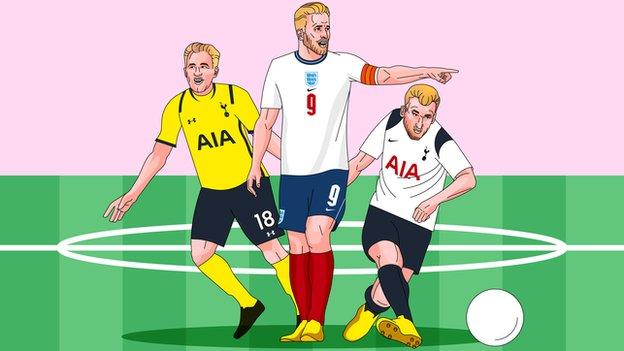
Harry Kane's journey to the top has not been without friction.
Now widely regarded as one of the best strikers in the world and the finest English goalscorer of his generation, Kane has come a long way since his lower-league loan struggles and fight to earn a regular start at Tottenham.
Here, BBC Sport speaks to coaches, team-mates, opponents and colleagues from every stage of Kane's career to chart not only his rise but how he has evolved as a player on the way.
The Loan Odyssey
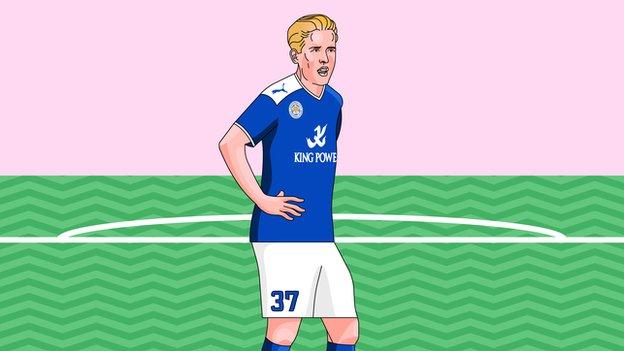
The shortened pitch at Millwall's training ground meant the keeper could easily throw out to the young loanee striker lurking down the other end, but what Kane did next was anything but simple.
With his eyes fixed on the ball as it fell over his shoulder, taking him away from goal, Kane had already decided his next move: he was going to shoot. Holding off the marker to his left, he wrapped his right boot around the dropping ball, sending a booming volley across to the far post and into the corner of the net.
"It was a copycat of Marco van Basten's one at Euro '88," remembers veteran defender Alan Dunne. "It was probably the best goal I've seen in training in my time. If I'd scored a goal like that, I would have run off waving my shirt around my head, but it didn't faze him. It was like it was expected."
Kane was just 18 when he and midfielder Ryan Mason were shipped to the intimidating surrounds of The Den to aid the south-London side's Championship relegation battle in January 2012. He settled quickly and soon impressed with his focus, technical quality and thirst for improvement.
"He scored some of the best goals I've ever seen," says Australian centre-back Shane Lowry. "It was unbelievable - left foot, right foot, he was an absolute finisher; gets that one yard of space and bangs it.
"You see the goals he scores in the Premier League, where he just shifts and it's in the bottom corner before you even get a leg out. In that sense I could see the high quality he had. It was good for me just marking him in training. It was a learning curve."
An initial loan with third-tier Leyton Orient in 2010-11 had given Kane his first extended taste of first-team action, but it was while at Millwall that the future England captain began to show his potential as he found a degree of comfort in the men's game.
"I used to sit next to Harry in the changing room," says former defender Darren Ward. "After training every day, he used to sit on his spot and just stay there. You're thinking, 'What's he doing? What's he looking at?' He wouldn't move for a while.
"One day someone asked him, 'What are you doing Harry?' And he said: 'I'm just thinking about what I could improve on in training, how it went, what went right, what didn't'.
"Whenever I looked at him after training, he'd be sitting there, going over it in his head. That is a player who takes care of his football. He means business. And he was doing that at 18. That's incredible."
Kane's adjustment to competitive action in the Championship wasn't instantaneous however. He was on the scoresheet just once in his first 13 appearances for Millwall - an FA Cup brace against Dagenham & Redbridge.
But he grew into the campaign, building confidence as he began to exhibit the skills he had shown consistently in training. The high point was a stunning strike in a 3-0 win over Doncaster in March. Deployed on the left flank by manager Kenny Jackett, Kane received the ball close to the touchline and cut inside before unleashing a swerving 30-yard effort into the bottom corner.
"It was one of those horrible Tuesday nights, freezing cold," Ward recalls. "Harry was playing against quite a quick full-back and he wasn't getting any joy. Gradually he was getting deeper and deeper towards our goal. Then all of a sudden, he got the ball and cut inside. He shot from an angle and the swerve on the ball totally caught out the keeper.
"It took everyone by surprise. We were like, 'Wow, this guy really can hit a ball!' It was one of those moments where he wasn't doing anything in the game, and then, bang, he scores."
Kane finished the season in rich scoring form, with seven goals in his final 14 games. His performances helped Millwall avoid the drop and earned him the club's Young Player of the Year award. By the time he departed The Den, his team-mates were certain a bright future awaited the young striker, even if they couldn't anticipate the heights he'd reach.
"To break into the Tottenham first team, yes, but to be one of the top three strikers in the world? I don't think anyone would have expected that," says Ward. "I don't think you would have said he'd be where he is now."
The Breakthrough
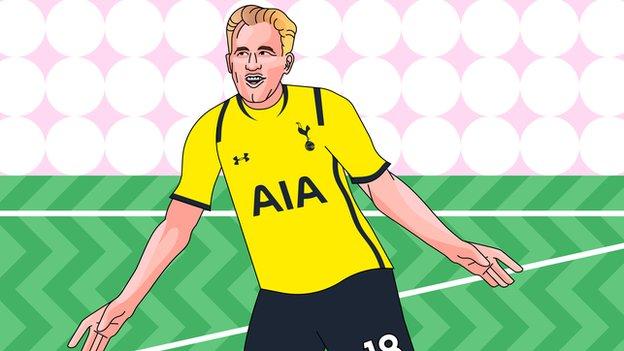
In July 2013, Swindon Town spent a week of their pre-season in Portugal's Algarve. There, the League One side enjoyed warm-weather training and played a couple of fixtures against a Tottenham XI made up mostly of young players.
Ward had just joined Swindon from Millwall, and in the tunnel before one of the friendlies spotted his former team-mate Kane. An informal relationship with Spurs had seen a handful of young players arrive on loan, with Grant Hall, Mason and Alex Pritchard all set to spend 2013-14 at the Wiltshire club. Rumour had it Kane would follow.
"Wardy, they want me to go on loan again," Kane confided. "I want to stay here. I'm good enough to get in this first team."
For most of the 2013-14 season, though, Kane continued to struggle to make a meaningful first-team impact at Tottenham.
After leaving Millwall, he'd spent disappointing spells with Norwich and Leicester. Neither had provided much in the way of senior match experience or confidence-boosting goals.
Kane had been sent to East Anglia at the start of the 2012-13 campaign with a view to building the youngster's exposure to Premier League football after a top-flight debut as an 85th-minute substitute in Tottenham's season-opening 2-1 defeat by Newcastle United.
He played the last 18 minutes of a 0-0 draw against West Ham in his Norwich debut, but a broken metatarsal saw him return to Spurs to recover before heading back to Carrow Road in late December. By February, he had made just two more Premier League appearances for the Canaries and Tottenham decided to cut his loan short.
He spent the remainder of that season at the King Power Stadium, but struggled to break into a team pushing for promotion from the Championship. There is a well-circulated picture of Kane sat alongside Jamie Vardy on the Leicester bench at Vicarage Road as Nigel Pearson's side lost 3-1 to Watford in the second leg of their play-off semi-final. The England captain has since reflected on his loan in the East Midlands as the most difficult period of his career.
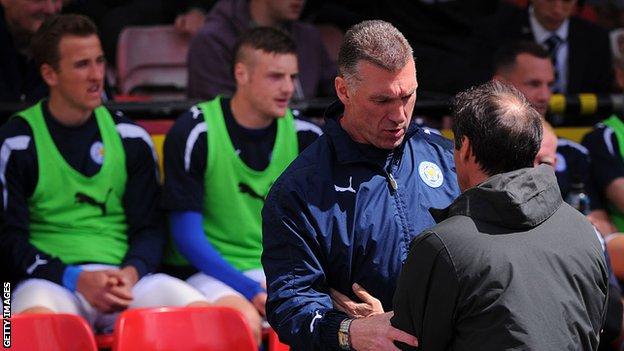
By the time he returned to Tottenham for the 2013-14 season, there was little clamour to see the young striker given a sustained chance in the senior side. He had to content himself with sporadic Europa League and League Cup appearances. Still, there were those within the club who maintained great belief in Kane, and they would soon be in a position to act on that faith.
"It was all part of his development," says Chris Ramsey, the Queens Park Rangers technical director who was Tottenham's head of player development at the time.
"Not every loan you go on works out. But it helped him be more resilient and work out what he needed to do when he played. We never really looked at those loans as failures, more as a learning curve.
"His mentality was one of the prominent things in his career early doors. When he started off, he wasn't very quick, but he always had a good mentality towards training and excelling and becoming the best he could be."
In December 2013, Andre Villas-Boas was sacked as Spurs manager. Tim Sherwood was promoted from his role leading the club's under-23s - where he'd worked with Kane - to act as caretaker boss, bringing Les Ferdinand and Ramsey into his first-team coaching staff. It heralded Kane's breakthrough at White Hart Lane.
Prior to Sherwood's appointment, Kane's only two Premier League appearances accounted for a miserly 12 minutes' game time. On New Year's Day 2014, his third top-flight outing - replacing Roberto Soldado in the 75th minute of a 2-1 defeat by Manchester United - eclipsed that sum. On 7 April, he was handed his first Premier League start, in a 5-1 win over Sunderland, and scored his first league goal for Tottenham.
"You have to have the bravery of Tim Sherwood and Les Ferdinand to put him in the team ahead of Soldado, who was a Spain international at the time," says Ramsey of the decision to give Kane a sustained run in the team. "It showed the confidence the club had in him.
"When we took charge, there was talk of him going back on loan, and he said, 'No, I'm not going. I don't want to go'. He backed himself, knowing that we rated him, and that if he kept on doing what he was doing - and the first team at that time weren't doing what they needed to do - that we'd play him."
Kane made it three goals in three games when he followed up his Sunderland strike by scoring against West Bromwich Albion and Fulham. These early outings weren't all plain sailing for the 20-year-old; he scored an own goal in the season's penultimate fixture against West Ham, and failed to register at the right end in his last three appearances of the campaign. But the new management team's faith in him remained staunch. They were as impressed by how he reacted to adversity as they had been with his initial scoring run.
"We knew that the coaches at the club and himself - mainly himself - had got him to a level where he was equal to the players in the first-team squad," Ramsey adds.
"We had no worries about him. People forget, at the time we were maligned for playing him ahead of those who were there, but he proved everybody wrong."
Mauricio Pochettino was installed as Tottenham's permanent manager for the 2014-15 season, and again Kane had to prove himself. He did so, first in the Europa League and League Cup, scoring 10 goals between the two competitions, then opening his Premier League tally against Aston Villa in November.
Kane finished the season with 21 league goals, 31 in all competitions, and was named PFA Young Player of the Year. He'd established himself as a ruthless finisher, converting 18.8% of his shots.
By comparison, Sergio Aguero, that year's Golden Boot winner, scored 17.6% of his attempts on goal. After a bumpy ascent early in his career, Kane was quickly becoming recognised as one of Europe's best young talents.
"One thing Harry's got that's the same with all the great players - the Messis and Ronaldos - he wants to play, because he wants to score," says Ramsey.
"If you're in the Carabao Cup, he'd want to play. He'd have to be injured to not want to play, because he'd be looking at the end of his career and thinking, 'I could have played and scored and been the top scorer and broke this record and that record'.
"I definitely would have said he was good enough to play in the Premier League, good enough to play for England. Good enough to become the phenomenon that he has? I can't say I would have predicted that.
"But if anybody had the will to become world class, I definitely would have said it was him."
The High-Volume Shooter
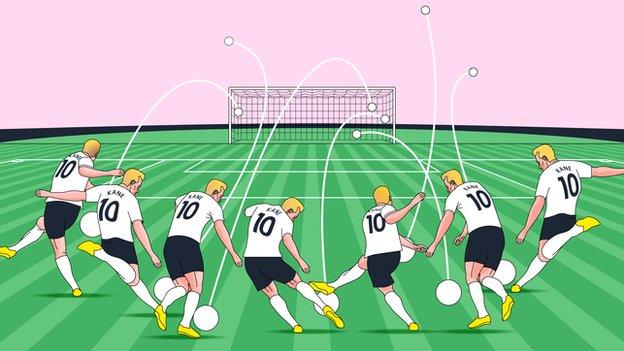
In 2017, Kane became only the fourth player in Premier League history to score at least 20 goals in three consecutive campaigns - after Alan Shearer, Ruud van Nistelrooy and Thierry Henry. He achieved the feat with startling efficiency. The increasing precision of his finishing had resulted in a return of 29 league goals in 2016-17, with a career-high chance-conversion rate of 26.4%.
Then his approach changed.
On average, Kane took 3.9 shots per 90 minutes in the Premier League in 2016-17; the season before, that average was 4.2, and in his breakthrough 2014-15 campaign it was 3.9.
In 2017-18, Kane shot for goal, on average, 5.4 times per 90 minutes. That equated to a total of 184 shots, by far the highest in the league for the season. The next-highest was Liverpool's Mohamed Salah with 144. No other player shot more than 100 times.
It appeared Kane was following Cristiano Ronaldo, who regularly averaged more than seven shots per game at Real Madrid as he became one of the most prolific forwards the game has ever seen.
Kane finished the campaign with the second-lowest conversion rate of his career (16.3%) but a best-ever haul of 30 league goals. According to understat.com, Kane's total for expected goals (xG) - a metric which uses historic shot data to measure the scoring probability of every attempt a player makes - was 26.86. The previous season he'd scored 29 goals from just 19.82 xG.
"It's hard to say whether it's been a conscious effort," says Jonathan Hill, who worked as an analyst at Tottenham under Pochettino.
"As he went on through his career and once he started finding confidence at centre-forward, it's no surprise that then he has the absolute backing of his ability to go and shoot, because he does that in training. I don't think it was a conscious effort to say 'I need to shoot more'. I think it was just a player who had found their confidence and had absolute belief in his ability.
"Most players don't have the mentality that Harry does. Whether he misses or not, he's still going to deliver the same perfect technique that he's groomed over hours and hours of training. Maybe for a lesser player, that miss weighs on them and doesn't allow them to execute the technique, or it affects them in that they pull away from the opportunity for fear of shooting. He hasn't got that."
That confidence in his technique was honed at Tottenham through the same focus, intensity and dedication that caught the eye of his Millwall team-mates as a teen.
And again - there was no chance of him standing still.
The Creator
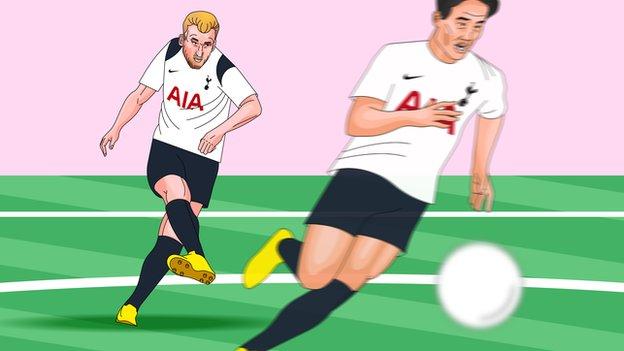
Kane has scored eight Premier League hat-tricks in his career, the most recent coming in a 5-2 victory over Southampton on Boxing Day 2017. Spurs beat Southampton by the same scoreline on the second weekend of the 2020-21 season. This time, Kane scored just once while producing an altogether rarer statistical feat; providing four assists, all for strike partner Son Heung-min.
By March, Kane and Son had set a new Premier League record for goal combinations, linking up as scorer and assist provider 14 times to beat the previous high mark set by Alan Shearer and Chris Sutton during Blackburn Rovers' 1994-95 title triumph.
At the end of the season, Kane collected his third Premier League Golden Boot, with 23 goals, and for the first time he topped the assists charts, too. His 14 assists doubled his previous best.
But while Kane's creative skills have flourished more than ever this past season, his ability to provide for others is no surprise to those who have worked with him throughout his career.
"I remember I'd been out for a while and my first England game back he assisted me with a goal," Danny Welbeck says, thinking back to that 4-0 win over Malta in 2017. "It's always something he's had in his locker. He's got that great technical ability where he can either strike a ball into the back of the net or strike a ball across the field and play you through.
"Once you see a player like him on the ball, you know he can make that all-important decisive moment. He knows football very well. If you're a striker and you're making runs, you know that he's been in those positions and you know he knows where you want the ball.
"He's a great team player. He's a pleasure to play with and a pleasure to watch."
With England's squad for the European Championship containing attacking players such as Raheem Sterling, Marcus Rashford and Jadon Sancho - all of whom offer the pace and directness to threaten the space behind opposition defences - Kane's ability to drop deep and create could prove just as vital as his goalscoring this summer.
"Harry has always had that capability," says England manager Gareth Southgate. "He's always been able to play, from a very young age, as a number nine or a number 10. Clearly that's been more pronounced this year in terms of the numbers.
"He's done that with us. For a centre-forward who is such an outstanding goalscorer, he has got a fabulous weight of pass and great vision to see those passes.
"He's an all-round outstanding player."






























